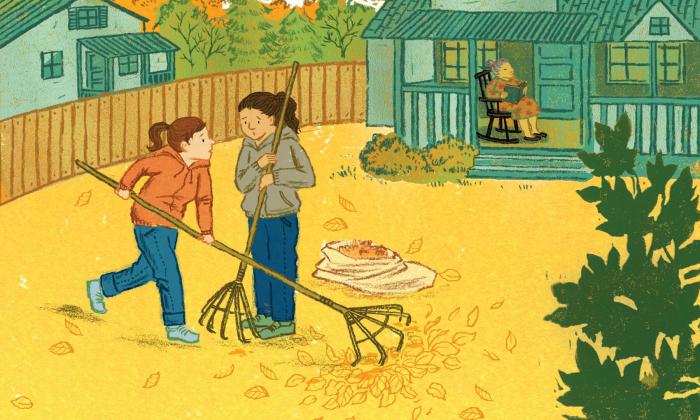
“It’s a big backyard, but somebody’s got to rake it,” Annie joked. She and her best friend, Beth, stood in the driveway as Mrs. Collins’s garage door slowly creaked open.
They had their hair pulled up in matching brown ponytails to keep it out of their faces while they worked. Annie’s ponytail was straight, and Beth’s was curly. They both wore school-spirit sweatshirts, old jeans and sneakers. The air held a slight chill, but the sunshine made it a perfectly nice day to do yard work.
Mrs. Collins, their elderly neighbor, came into the garage. She held out two pairs of work gloves in one hand, and said, “Here you go, girls.”
The three of them walked out into Mrs. Collins’s yard. The girls slipped on the gloves and grabbed a couple of rakes. They had a job to do.
Across the street, a neighbor came out into her yard with a brightly-colored campaign sign. It read, “Re-elect Our Mayor!” Mrs. Collins muttered something under her breath. Annie and Beth smiled at each other. It was funny when she did that.
“Oh, for Pete’s sake,” Mrs. Collins said, speaking louder. “How did we end up with a black man for mayor? He doesn’t know the first thing about running a city.” Her voice trailed off as she headed to the front porch.
Annie and Beth dragged the rakes and some huge paper trash bags into the yard. The bags were almost as tall as they were.
“Annie?” Beth whispered as they started to rake. “Did you hear what Mrs. Collins just said?”
“Yes,” Annie answered. “It made me feel uncomfortable.” She glanced at Mrs. Collins, sitting on her porch.
“I didn’t think anyone we knew would act that way,” Beth said. “Everyone knows that you shouldn’t judge people by their skin color. Don’t they?”
“Maybe not,” Annie said. “Mrs. Collins is older and things were different when she was growing up.”
“But those days are over,” Beth said.
“What do we do?” Annie asked.
“Maybe we should say something,” Beth suggested.
“I don’t know,” Annie said. “She’s so much older than us. It would feel strange.”
The girls finished raking the yard. Mrs. Collins rocked on the front porch. She spoke occasionally, but the girls could not make out what she was saying.
The girls dragged the leaf bags to the curb. “If we ignore it, we won’t feel right later,” Beth said.
So they marched up to the porch.
“Mrs. Collins?” Annie spoke hesitantly. She felt nervous.
“Yes, dear?”
“We wanted to ask you about what you said before. About the mayor.”
Beth stepped forward. Annie had been brave; she could be, too.“Yes,” Beth said. “We think a black person can be just as good a leader as a white person.”
Mrs. Collins sighed and looked down at her shoes. She raised her head after a moment.
“I’m sorry I said that,” she said. “I grew up hearing racist language all the time, but that was a long time ago. I know better now, and I shouldn’t have said it whether I disagree with the mayor’s politics or not.”
Beth and Annie breathed sighs of relief. “Thanks, Mrs. Collins,” Beth said.
Mrs. Collins paid them for their work. “Now, you girls go have some fun.”
“Bye, Mrs. Collins,” Annie said. “We’ll see you in a couple of weeks.” A leaf raker’s job was never really done. At least, not until winter!
Questions for Readers
Right There (in the text):
What time of year does this story take place? Provide evidence from the story to defend your answer.
Think and Search (in the text):
Underline two very important parts of the story: the biased comment made by Mrs. Collins and the brave response given by Beth.
Author and You (in my head):
Mrs. Collins’s age comes up a couple of times in this story. Explain how age matters in this story.
On My Own (in my head):
Have you ever wanted to speak up to someone who said something biased or hurtful? Did you? Explain what happened and what influenced your decision.